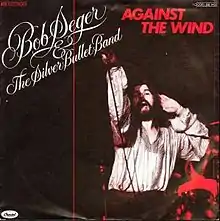Against the Wind (Bob Seger song)
"Against the Wind" is a song by Bob Seger & The Silver Bullet Band from the 1980 album Against the Wind. Released as the second single from the album, it peaked at number 5 on the Billboard Hot 100.[3]
| "Against the Wind" | ||||
|---|---|---|---|---|
 | ||||
| Single by Bob Seger & The Silver Bullet Band | ||||
| from the album Against the Wind | ||||
| B-side | "No Man's Land" | |||
| Released | April 1980 | |||
| Genre | ||||
| Length | 5:34 (album version) 3:45 (single version) | |||
| Label | Capitol | |||
| Songwriter(s) | Bob Seger | |||
| Producer(s) | Bill Szymczyk | |||
| Bob Seger & The Silver Bullet Band singles chronology | ||||
| ||||
| Alternative cover | ||||
 German cover | ||||
Background and writing
During an interview on WWFX, "100 FM The Pike", Bob Seger said that "Against the Wind" came about from his days as a high-school cross country runner. He described the song as "about trying to move ahead, keeping your sanity and integrity at the same time."[4] The "Janey" Seger references in the opening lyrics of the song refers to Janey Dinsdale, with whom he had a long-term relationship from 1972 until 1983. In Rolling Stone, Seger elaborated on the song's meaning:
Janey says to me all the time, 'You allow more people to walk on you than anybody I've ever known.' And I always say it's human nature that people are gonna love you sometimes and they're gonna use you sometimes. Knowing the difference between when people are using you and when people truly care about you, that's what "Against the Wind" is all about. The people in that song have weathered the storm, and it's made them much better that they've been able to do it and maintain whatever relationship. To get through is a real victory.[4]
Seger later said that the line "Wish I didn't know now what I didn't know then" bothered him for a while, but that everyone he knew loved it, so he left it in. He also said that it has since appeared in several other hits by other artists, so that proved it was an acceptable lyric.[5]
Music critic Maury Dean described the theme as being about aging and dealing with "all the burdens we'll ever have to face."[6] Billboard Magazine described "Against the Wind" as "a midtempo folky tale of young love featuring pretty piano backing."[7]
Rolling Stone Magazine critic Dave Marsh stated in his review of the Against the Wind album that none of the ballads (including the title track) contained any memorable lines, but he later amended that to acknowledge that the lines "Well, those drifter's days are past me now/I've so much more to think about/Deadlines and commitments/What to leave in/What to leave out" are not only memorable but also haunting in the way Seger "haltingly expresses his indecisiveness."[8]
Chart performance
Weekly charts
|
Year-end charts
|
Cover versions
In 1999, Brooks & Dunn covered this song on the television soundtrack to King of the Hill. This version peaked at number 55 on the Hot Country Songs charts based on unsolicited airplay.
The song was also covered by The Highwaymen on their debut album.
In 1978, two years before the US release, the song was covered (translated to Spanish under the title "Contra el viento") by Argentine rock band Plus on their second album Melancolica Muchacha.[12]
The Hold Steady released their version of the song on their 2007 Stuck Between Stations EP.
Garth Brooks covered the song for the 2013 Classic Rock album in the Blame It All on My Roots: Five Decades of Influences compilation.
In popular culture
The song was played in the movie Forrest Gump, where Forrest was running across the country.[13]
References
- Jesús A. Ramos-Kittrell (15 December 2019). Decentering the Nation: Music, Mexicanidad, and Globalization. Rowman & Littlefield. p. 95. ISBN 978-1-4985-7318-4.
- "Sound Familiar? 10 Famous Cameos That May Surprise You - 60s and 70s Pop - Oldies Music". May 26, 2015. Archived from the original on May 26, 2015.
- Whitburn, Joel (2002). Top Pop Songs: 1961-2001. Record Research. p. 218.
- White, Timothy (May 1, 1980). "The Fire This Time". Rolling Stone. Retrieved November 20, 2019.
- Bob Seger & The Silver Bullet Band Greatest Hits, CD sleeve.
- Dean, Maury (2003). Rock 'n' Roll Gold Rush. Algora Publishing. p. 359. ISBN 087586208X.
- "Top Single Picks" (PDF). Billboard Magazine. May 3, 1980. p. 55. Retrieved 2020-07-08.
- Marsh, Dave (1985). Fortunate Son. Random House. pp. 129–132. ISBN 0394721195.
- Kent, David (1993). Australian Chart Book 1970–1992. Australian Chart Book. ISBN 0-646-11917-6.
- "Top 100 Singles (1980)". RPM. Archived from the original on 2016-04-25. Retrieved 2017-07-21.
- "1980 Talent in Action – Year End Charts : Pop Singles". Billboard. Vol. 92 no. 51. December 20, 1980. p. TIA-10. Retrieved 5 April 2020.
- "Melancólica muchacha". rock.com.ar.
- "Forrest Gump - Run Scene". YouTube. August 29, 2012.